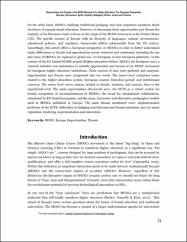| dc.contributor.author | Schuwer, Robert | |
| dc.contributor.author | Gil-Jaurena, Ines | |
| dc.contributor.author | Aydın, Cengiz Hakan | |
| dc.contributor.author | Costello, Eamon | |
| dc.contributor.author | Dalsgaard, Christian | |
| dc.contributor.author | Brown, Mark | |
| dc.contributor.author | Teixeira, Antonio | |
| dc.date.accessioned | 2019-10-18T18:43:40Z | |
| dc.date.available | 2019-10-18T18:43:40Z | |
| dc.date.issued | 2015 | |
| dc.identifier.issn | 1492-3831 | |
| dc.identifier.uri | https://hdl.handle.net/11421/10380 | |
| dc.description | WOS: 000380030700003 | en_US |
| dc.description.abstract | The Massive Open Online Course (MOOC) movement is the latest "big thing" in Open and Distance Learning (ODL). MOOCs offer both opportunities and threats that are extensively discussed in the literature, including the potential of opening up education for all at a global scale. On the other hand, MOOCs challenge traditional pedagogy and raise important questions about the future of campus-based education. However, in discussing these opportunities and threats the majority of the literature tends to focus on the origin of the MOOC movement in the United States (US). The specific context of Europe with its diversity of languages, cultural environments, educational policies, and regulatory frameworks differs substantially from the US context. Accordingly, this article offers a European perspective on MOOCs in order to better understand major differences in threats and opportunities across countries and continents, including the use and reuse of MOOCs for regional or global use, via European or non-European platforms. In the context of the EU funded HOME project (Higher education Online: MOOCs the European way), a research initiative was undertaken to identify opportunities and threats of the MOOC movement for European higher education institutions. Three sources of data were gathered and analysed. Opportunities and threats were categorized into two levels. The macro level comprises issues related to the higher education system, European context, historical period, and institutional concerns. The micro level covers aspects related to faculty, teachers, and courses, thus to the operational level. The main opportunities discovered were: the ECTS as a robust system for formal recognition of accomplishments in MOOCs; the trend for institutional collaboration, stimulated by EU-funded programs; and the many innovative and alternative pedagogical models used in MOOCs published in Europe. The main threats mentioned were: implementation problems of the ECTS, difficulties in bridging non/informal and formal education; and too much regulation, hindering experimentation and innovation. | en_US |
| dc.description.sponsorship | European Union under European Commission, DG EAC, under the Lifelong Learning Programme [543516-LLP-1-2013-1-NL-KA3-KA3NW] | en_US |
| dc.description.sponsorship | This research was conducted in the framework of the European Union-funded project HOME Higher education Online: MOOCs the European way (Ref. 543516-LLP-1-2013-1-NL-KA3-KA3NW) under the support of the European Commission, DG EAC, under the Lifelong Learning Programme. The authors wish also to extend their acknowledgements to all the contributors and participants to the conference "Mapping the European MOOC Territory" held in Porto on 27th November, 2014, for their contribution to this study. | en_US |
| dc.language.iso | eng | en_US |
| dc.publisher | Athabasca University Press | en_US |
| dc.rights | info:eu-repo/semantics/openAccess | en_US |
| dc.subject | Mooc | en_US |
| dc.subject | Europe | en_US |
| dc.subject | Opportunities | en_US |
| dc.subject | Threats | en_US |
| dc.title | Opportunities and Threats of the MOOC Movement for Higher Education: The European Perspective | en_US |
| dc.type | article | en_US |
| dc.relation.journal | International Review of Research in Open and Distributed Learning | en_US |
| dc.contributor.department | Anadolu Üniversitesi | en_US |
| dc.contributor.authorID | Gil-Jaurena, Ines/0000-0001-7045-0689; Costello, Eamon/0000-0002-2775-6006; Schuwer, Robert/0000-0001-5756-5406; Dalsgaard, Christian/0000-0001-9042-6512 | en_US |
| dc.identifier.volume | 16 | en_US |
| dc.identifier.issue | 6 | en_US |
| dc.identifier.startpage | 20 | en_US |
| dc.identifier.endpage | 38 | en_US |
| dc.relation.publicationcategory | Makale - Uluslararası Hakemli Dergi - Kurum Öğretim Elemanı | en_US |


















